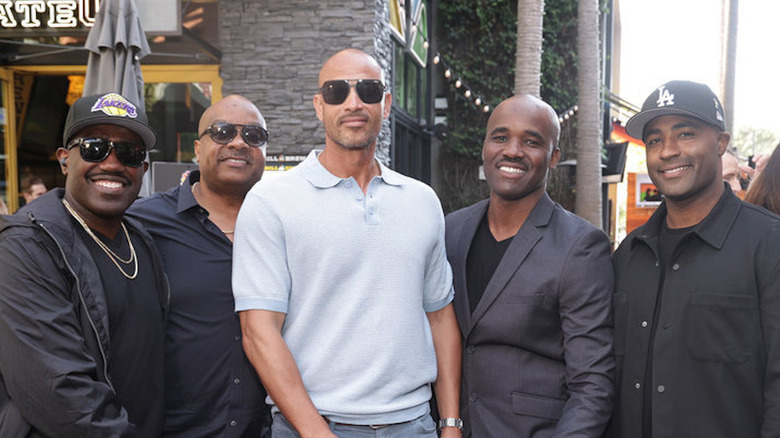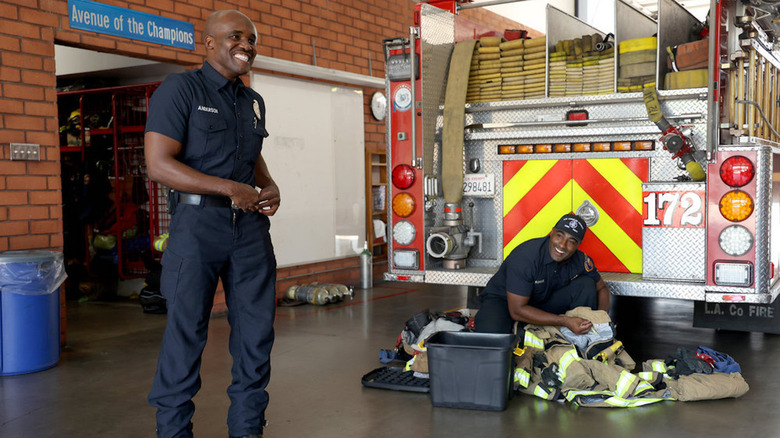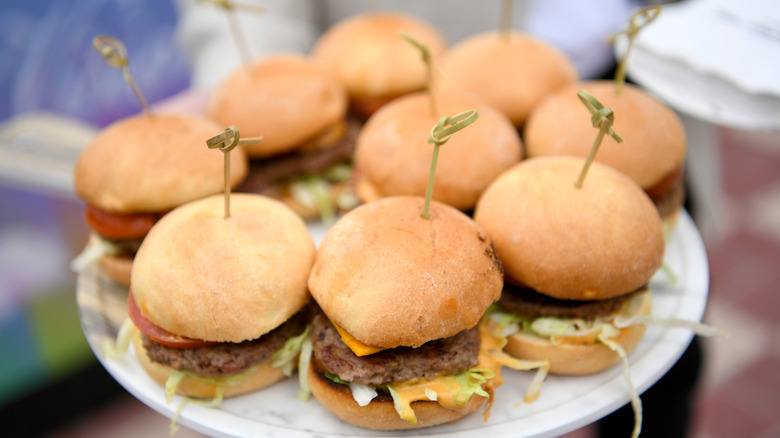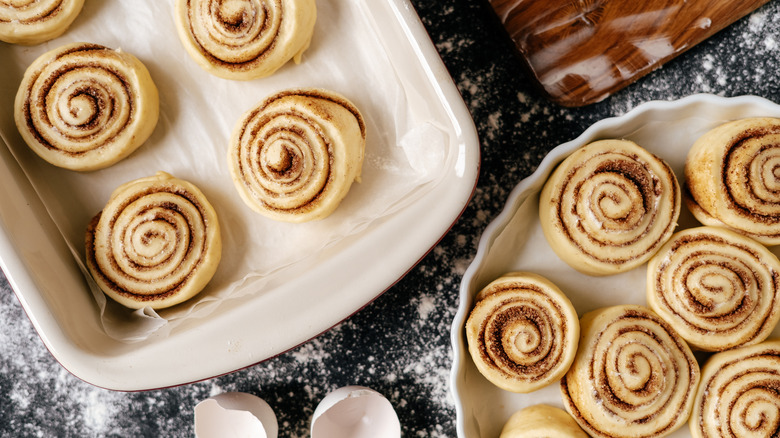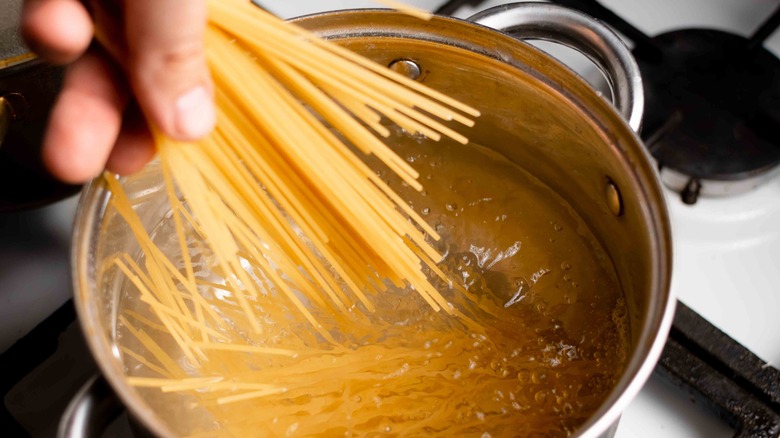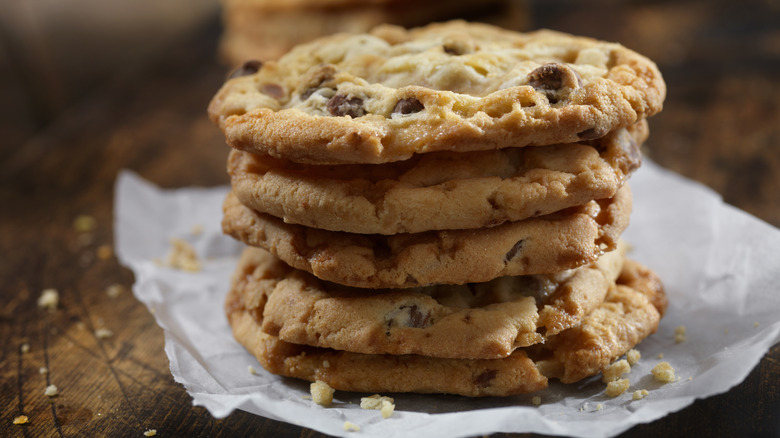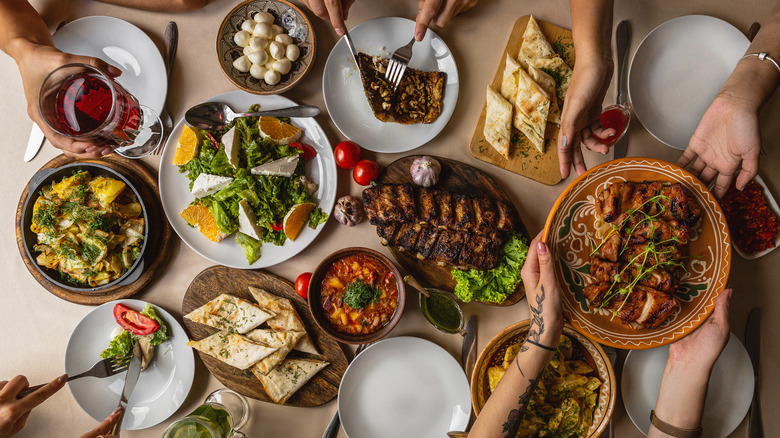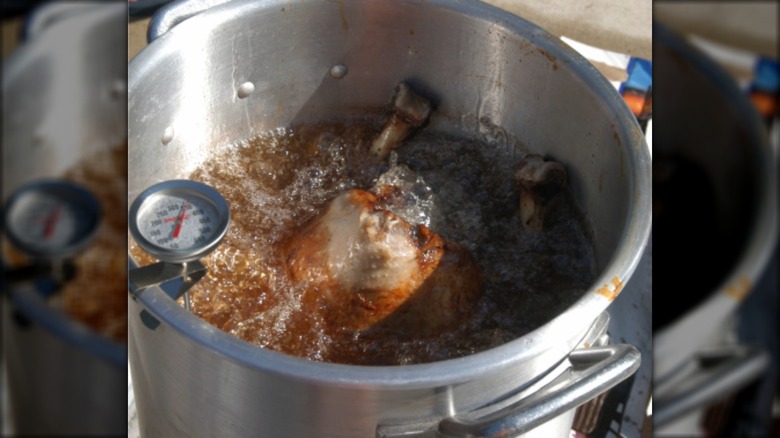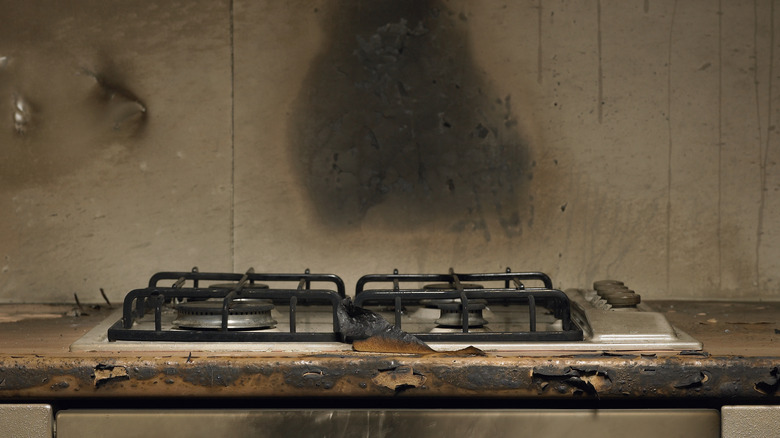What LA Fire & Rescue Firefighters Wish You Really Knew About Grease Fires - Exclusive Interview
NBC's new show "LA Fire & Rescue" is coming in hot this season. From the mind of well-known crime drama producer Dick Wolf comes this docuseries that follows real-life heroes in the Los Angeles area, and Mashed had the opportunity to speak in an exclusive interview with some of the firefighters featured in the show. Mike Anderson, Dushone Roman, and Chris Davis from Station 172 in Inglewood told us all about their favorite firehouse eats and how they fuel their bodies to serve their community.
While people may think of chili and hot dogs when they think of firefighters, the foods they prepare in the firehouse are far more elaborate and health-conscious than the stereotype allows. Of course, that doesn't mean there isn't the occasional cookie. During our conversation, they also told us about the most common causes of kitchen and cooking fires — and what we can all do to prevent them so that no one has to get a house call from their local fire department.
Filming begins
What was it like having the filming crew around for "LA Fire & Rescue"?
Mike Anderson: It was an adjustment at first. There was one time ... it was one of the first days they came. We just got back from a call, and the cameras [were] around and they're like, "Hey, talk about your day." We're like, "We went on a boat today. We ate at Chick-fil-A." It was weird ...
Dushone Roman: You got to understand that the fire department doesn't normally like to talk about themselves, as in broadcast what they do. We just go on calls and do it. Now, for the first time, you have cameras showing what we're actually doing on a day-to-day basis. It was surreal and weird at first, but guys like Mike and Cap here dove right in and became superstars overnight.
Anderson: After maybe two or three shifts, it was almost like the cameras weren't there — you kind of forgot about them.
Chris Davis: Yes. Initially, when the cameras were there, you're walking around, you're very cautious about what you say, you're worried about how you're going to be judged by your peers, and you're trying to do everything perfectly. But after a while, you realize that, "Hey, we've been trained well. We know what we're doing." You relax a little bit and allow the camera crew in. We started developing a rapport with them — started to have a little family vibe with them. Over time, you saw that it was a natural environment after a while.
What happens if the alarm goes off mid-cooking a meal?
Anderson: You yell a curse word and you're like, "Ooh," and then keep going. Typically, if it's one of the units ... Out of 172's [station], you have an engine company and the paramedic squad. Typically if it's just one of us, then the unit that didn't get the call [will] pick up the slack where the cook left off. Sometimes we'll switch, and if, say, the person that's cooking is on the squad that day, they'll switch with the firefighter. They'll jump on the squad, and they'll stay back and cook. But there have been times where we've gotten calls [while] we were trying to cook and didn't eat 'til about 10 o'clock at night.
Roman: I definitely didn't think you were going to be the guy answering that one, Mike.
Anderson: Hey, man, I still got ... [I cook] Mike'sghetti.
Roman: Mike doesn't always cook.
Grocery shopping
What do the grocery runs look like?
Roman: The grocery runs are the coolest moments. That's when we get to go out in the store and actually interact with people. It never fails — any time we're in the store as a crew, many people will come up to the cart: "Hey, what are you cooking? What's on the menu?" It's pretty cool to get a chance to talk to some of the local people about food and how we're eating it.
It actually forces us to eat a little bit healthier because we know we're not going to be judged by certain people looking in our cart. But some days after a crazy shift or knowing that we're deserving of something, a good meal, because we've been training so much ... We'll throw some good stuff in our cart for the guys, specifically the guys that you have on this interview right now you want to do well for. You want to cook a good meal. Occasionally, we'll throw a steak and some potatoes, or Mike will treat us to his famous spaghetti meal. The grocery store times are always fun because you get to laugh with your buddies that you work with and interact with the public in a good way.
Do you have a particular store that you like to shop at?
Anderson: Ralph's. It's in our area pretty much. It's the Ralph's at the Ladera Center. That's where we go — shout-out to Ralph's!
How do you decide on firehouse menus?
Davis: The firehouse menu is normally decided by the person who is designated to cook for the shift. We have a shift rotation where each member of the crew has their turn to cook. When that individual is the person that's cooking for the day, he comes up with a menu. We have a few people that have some dietary concerns, and normally they'll say, "Hey, is there anyone with any dietary concerns?" They'll try to be somewhat accommodating to that. From there, they basically come up with the menu for the day.
Most of us have a few meals in our hip pocket that we always have ready in case we're the cook for the day, or in case you forgot to look at the schedule and see that you were cooking that day. Most of us have a couple meals that we keep in our hip pocket that are pretty universally friendly to just about everyone who's coming into the station for that day.
Big appetites
How much food do you have to prepare for per meal?
Roman: That's actually a good question. It varies per the [number] of people you have at your house. At 172, we have five people — three on the engine, two on the squad. But you could work at a bigger house that has as many as 10 and 12, and sometimes even more. That's a little bit hard.
You have to be aware of how to make certain items. If it's something like a burger [for] 12 people, it's easy. But how much pasta do you make for 12 people? That's where it becomes ... "How many tomatoes do you have to have? How many onions do you need for 12 people?" You have to learn how to scale your everyday meal, that same meal that [Chris] was talking about. You have to be able to scale it up and scale it down, and to make edits because of people's dietary needs. We always plan it sometimes and then run short on things, and that's why McDonald's is always good. Taco Bell's close.
Anderson: Popeye's is right down the street.
MasterChef in the firehouse
Who's the best cook right now?
Anderson: I make the best Mike'sghetti, that's all I'm saying. I'm going to put it out there. I ain't calling it spaghetti — I'm saying Mike'sghetti. I'm the only one that makes it, so I'm the best one to make it.
Davis: Out of the three of us, it's probably [Dushone]. [Dushone] is probably the better cook out of three of us. I've had a couple of his meals; he's got some next-level type meals that are pretty tasty.
Anderson: He makes a cinnamon bun from scratch.
Davis: In the department itself, we have a lot of good cooks that have ... you can tell there's some people that come from families with some long-lasting recipes that they brought into the firehouse and have shared with us. We also have individuals who probably weren't good cooks and took some cooking classes and developed some skills over the years.
It's a mixed bag. We have some not-so-good cooks as well. When you have a person that comes to the station that isn't a good cook, guys can pretty much sense that. The guys normally chip in and support that person — "Hey, maybe you should try adding a little bit more salt, pepper on this," or whatever.
Roman: I always tell people, if you have at least three to five meals in your back pocket, you can be a good cook in the firehouse. Because we have three to five meals, you can always mix and match now. Once you can make the rice with this meal with the chicken of that meal, you can make the beef with this meal now with the noodles of that meal.
I won't lie — I stole some of my best meals from people in the fire service. I've watched them make certain things. I've learned how they do it. Their mothers, grandmothers, or their grandmother's mothers from Italy brought these tomatoes, and you watch and learn. You can piecemeal some great meals by watching people in the firehouse. We have guys that used to be resort chefs, and we have guys who are self-taught. Captain Davis is modest right now — he's pointing fingers at other good cooks, but he's nice in the kitchen as well.
Meal no-go's
What are some of the go-to meals in the firehouse?
Anderson: Mike'sghetti!
Roman: That's the good one. We should more probably talk about the no-go meals in the firehouse — the taco salad, the spaghetti.
Anderson: Hey, it's easy to make, especially when you're at a firehouse. You get in there, make it, get it done, the crew eats, and then you're full and you go in call crew. It's nice and easy. Don't hate on the taco salad.
Roman: The taco salad is one of those meals where that was everyone's first meal. They learned the chop up everything, throw it in ... and the spaghetti. But Mike seemed to have finally perfected spaghetti after 19 years in the fire service.
Anderson: See, they're being modest. What some people fail to understand is when you have children, you have to cook, because it gets expensive out there on those streets. I don't have no kids — I ain't never had to cook for nobody but myself. McDonald's fed me.
But when I got in the fire service, people will mess with you if you don't cook when it's your cook shift, and [you'll] get labeled a dirtbag for the shift because you didn't cook. So I went and devised Mike'sghetti. There you go, bam! Oh, I didn't tell you two guys — I got a nice teriyaki salmon I make now ...
Roman: The taco salads, the spaghetti — those are all divvies, but guys sounded impressed. Guys know how to cook around here. They'll make the fancy reduction sauces and fancy, I can't even tell you what they are ... cordon bleu meals. The guys will try to whip up some stuff, and you can use the fire service as a little trial before you go to the big stage sometimes. It's a good place.
Cookie monster
Are there any snacks you always have on hand?
Roman: Cookie Monster — tell them, Mike.
Anderson: Chocolate chip cookies. That's my guilty pleasure. I would've been kidnapped as a kid a hundred times over. You know how kidnappers typically offer candy? If they would've offered me cookies, I would've been in that van plenty of times. Good, good cookie. Chocolate chip cookies — that's my snack right there.
Roman: Let's let them know how healthy we are, though. We do have a wide variety of stuff. We do have fruits and stuff available. I got kids; I got to let them know [we're] eating [healthy things].
Anderson: We do have fruit, yes. Fruit's good for you — nature's candy.
Roman: Here's something that is a little secret — the ants on a log. I only learned about this a couple years ago. It's celery, peanut butter, some raisins, and Mike's chocolate chips. I'll throw those on there and create ants on a log. It's something. It's a little goofy.
What is the top pantry staple that you always have in the firehouse?
Anderson: Oreo cookies.
Roman: Mine is licorice ... Red Vines.
Anderson: [They] said pantry staples.
Roman: Oh, we're still on snacks.
Anderson: Knuckle trail mix. Trail mix with everybody's knuckles in there.
Feeding the masses
Do you have any tips for feeding large groups of people?
Roman: Make enough.
Davis: Yes. In the firehouse, one of the rules is as long as it's hot and you have a lot of it, you're doing okay. You never want to come up short. You always want to have a little bit more than less. If you have a little left over, that's fine too. You allow the next shift to come in and partake and enjoy some of the leftovers that you had from the night before. That's always a good thing. It's funny — I was thinking about this a little bit earlier, but over my career, things have changed quite a bit.
The portions pretty much would be a half a pound per guy as far as your proteins. Like Dushone said, you would have your meal set up for at least five people. But I worked at stations where I had 13 guys at a station. You double it plus a little bit extra, or I would actually go three times that — 15 — and that would give me enough leftovers if I had some big eaters. It always works out. If guys see more, they eat more. That's usually how it goes with the fire-up. If they see more, they eat more; if they see less, then they eat a little less, and you'll see them snacking later on. As a cook, if you see guys snacking later on, you go, "Maybe I should have made a little bit more."
We have that standard of about five people. If you have your recipe for five, then if you have 10 people, you double it. If it's 13, I triple it and have a little left over. That's the formula that I had, but the formulas are changing. The way people are eating in the firehouses is changing from [how it was] when I came on as a rookie. It was, "Hey, kids, we're doing steak and potatoes," and big Italian meals. Over time, I've seen it change to where it's a little bit more ... you see the avocados a little bit more, the healthy fats and the coconut oils, which is good. Over time, you learn better, and you do better.
I've definitely seen a change in the way that we're cooking. With the prices too — back when I got on the job ... you paid 10 bucks, you got two meals plus dessert, probably. Now we're up to two for $20, and guys are complaining that I'm not sure we're going to make it. But it's two for $20 just in the years I've been on the job, so there's definitely some changes going on. People are eating a little healthier than when I got on the job. It's interesting to see the ebbs and flows of the firehouse and firehouse dining, so to speak.
Holiday injuries
Are there any common injuries or fires that you see that pop up around the holidays?
Anderson: Yes — 4th of July, for example. This past ... actually, it was a little bit before the 4th of July. Someone literally blew their thumb off with an M-80. Finger injuries, typically a lot of firework injuries — people holding fireworks and not letting them go on time, or [fireworks] going off in their hands, or they're not setting up the fireworks correctly and they're shooting off into people. That's very common around that holiday, as far as injuries are concerned.
Other than that, around Christmas or New Year's, you get your traffic accidents from people driving and drinking — going out, partying, then trying to drive and getting into accidents, stuff like that.
Davis: Around Christmas [and] Thanksgiving time, you'll notice some diabetic emergencies. People are eating things that they probably shouldn't be eating, not taking their medication, maybe having a little too much vino during the holidays, and they throw off their metabolisms a little bit. We'll see a little bit of that.
Christmas tree fires during Christmas — it's a little less than what it used to be because you have a lot more artificial vegetation trees now, but before, you would've seen the Christmas trees. People weren't taking care of them properly. They heat up, and we would've had Christmas tree fires.
Anderson: Also, people during the holidays sometimes put some food on and forget, go shopping and whatever ... They have an oven that starts to smoke, smoke detectors go off, enough smoke builds up to where it starts coming out of their residence and the neighbors see it. That's when we get called out for a report of a structure fire. We get there — we have to sometimes force entry — and then it's somebody making beans or turkey or something ...
Davis: I'll give you one I thought about just now — frying turkeys, when you get outside and they're frying those turkeys ... I've seen some interesting things. One person was actually frying their turkey on their porch and created a fire, and it lapped onto the awning of their house and got that going a little bit.
Kitchen fire safety
What are the most common causes of kitchen fires?
Davis: The most common cause of kitchen fire is individuals not knowing how to cook. Usually, it's grease fires. Most of the fires that I've seen over the years are people who don't properly clean their kitchen, and they have a buildup of grease on their stoves, [they're] not properly caring for their kitchenware, or even have old equipment. We have some stove fires where a lot of the dripping is dripping into the oven, and they're not properly cleaning the ovens. That's usually where you see a large amount of kitchen fires.
Then, when the fires happen, they go get water and put it on an oil fire, which exacerbates the issue. Then they take off the oven door — open it — and it travels throughout the kitchen. That's generally how it happens. It's mostly caused by not properly caring for and cleaning your kitchen or equipment.
In a pinch, what is your go-to fast food restaurant?
Davis: The two that I hit the most would probably be Chipotle and Chick-fil-A. [Those are] my go-to's right now.
Anderson: Same — Chick-fil-A. But when I want a quick snack and have this yearning for fries, I'll hit up McDonald's. Those McDonald's fries are ... I don't know, something they do with them, they're like crack. They're good. I love McDonald's fries. That's all the guilty pleasure, by the way. French fries and chocolate chip cookies — there you have it.
New episodes of "LA Fire & Rescue" are available Wednesdays at 8:00 p.m. ET/7:00 CT on NBC. Episodes are available to stream the next day on Peacock.
This interview has been edited for clarity.
